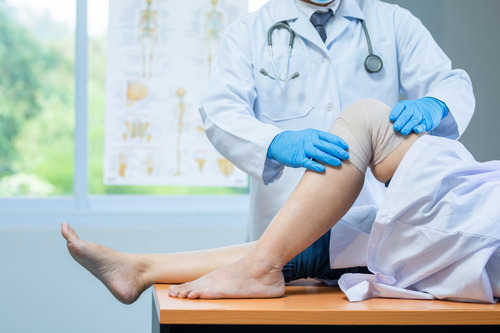At Georgia Spine & Orthopaedics, we specialize in orthopedic care, pain management, and neurology, focusing on treating injuries resulting from car accidents. With multiple locations across metro Atlanta, including Marietta and Tucker, we offer convenient access to comprehensive care. Whether you’re dealing with back pain, joint injuries, or neurological issues, we’re here to support your journey to better health.
After a car accident, your focus should be on healing, but recovery depends on more than rest. Documenting car accident injuries is one of the most important steps you can take to protect your health and support your insurance claim. Clear, timely medical records help doctors treat you effectively and give insurance companies the evidence they need to process your case.
In this blog, we’ll explain why documenting car accident injuries is essential, outline the key steps to do it properly, and show how seeking treatment from top Atlanta car accident doctors, like the team at Georgia Spine & Orthopaedics, can make a lasting difference in your recovery and claim.
The Medical Impact of Car Accident Injuries
Car accidents often cause injuries that can affect your health for weeks, months, or even years. Understanding these injuries helps ensure you get the right medical treatment and proper documentation.
Common Injuries Sustained in Car Accidents
Car crashes can lead to a wide range of injuries. These include soft tissue injuries like whiplash, spinal injuries, broken bones, and internal injuries. Some people also suffer from concussions or traumatic brain injuries. Even low-speed collisions can cause long-term damage to muscles, joints, and nerves. Documenting car accident injuries accurately helps medical providers create effective treatment plans.
Delayed Symptoms Can Be Serious
Many injuries do not appear right away. Pain, swelling, numbness, or trouble sleeping can show up hours or days after the accident. Emotional distress, anxiety, and difficulty concentrating are also common. Ignoring these symptoms can delay care and hurt your personal injury claim. Documenting car accident injuries early gives an unbiased account of how the injuries affect your daily life.
Why Immediate Medical Attention Matters
Getting immediate medical attention after a traffic accident is critical. It creates an official record that links your injuries to the car crash. Insurance companies look at medical records closely when evaluating a car accident claim. Waiting too long to see a doctor can weaken your case and slow your recovery.
Accurate Medical Records Support the Claims Process
Documenting car accident injuries plays a key role in the insurance claims process. Healthcare providers record your pain levels, physical limitations, and treatment plans. These records help insurance providers understand the scope of your injuries. They also support your personal injury case if legal disputes arise.
Why Documenting Car Accident Injuries Accurately Matters
Documenting car accident injuries clearly is essential for guiding treatment, tracking progress, and supporting insurance claims after a car accident.
Medical Records Drive Treatment Decisions
Orthopedic care relies on medical records to assess the full extent of injuries. These records include X-rays, MRIs, physical exams, and doctor’s notes. They help identify conditions like spinal misalignment, herniated discs, and joint damage. Without documenting car accident injuries properly, your care plan may miss key issues that delay healing.
Doctor’s Notes Validate Pain and Limitations
Detailed notes from your orthopedic specialist document pain levels, physical restrictions, and changes in function. This helps explain how the injuries affect your ability to work, move, and perform daily tasks. These observations carry weight with insurance companies and support your car accident claim.
Accurate Documentation Links Injuries to the Car Accident
To connect your injuries to the traffic accident, you need consistent, time-stamped documentation. Records showing immediate medical attention help prove the car crash caused your injuries. Without this, insurance providers may deny or reduce your claim.
Tracking Symptoms Supports Long-Term Care
Orthopedic recovery takes time. A detailed injury journal helps track pain, swelling, sleep problems, and emotional distress over weeks or months. This information guides your treatment and provides a clear picture of your recovery for all healthcare providers involved.
Supporting the Insurance Claims Process
Insurance companies require documenting car accident injuries promptly before approving compensation. They review medical bills, doctor’s assessments, and treatment plans. Accurate, complete records help you recover costs related to lost wages, medical care, and non-economic damages like pain and suffering.
Key Steps to Documenting Car Accident Injuries Properly
Following a car accident, documenting car accident injuries properly helps protect your health and strengthens your insurance claim.
Seek Immediate Medical Attention
Always get medical care as soon as possible after a traffic accident. A prompt exam creates an official record linking your injuries to the car crash. Waiting too long allows insurance companies to question the cause of the injuries. Early evaluation also helps identify hidden issues like internal injuries or joint damage.
Take Photos of Injuries from Different Angles
Photograph all visible injuries such as bruises, cuts, or swelling. Take pictures from different angles and under clear lighting. Update these photos regularly to show how your injuries change over time. This visual evidence supports your personal injury claim and shows the full impact of the accident.
Keep a Detailed Injury Journal
Record your symptoms daily. Include notes on pain levels, mobility issues, trouble sleeping, emotional distress, and missed workdays. This journal gives an unbiased account of how the injuries affect your daily life. It helps healthcare providers adjust your treatment and supports claims involving non-economic damages.
Save All Medical Records and Bills
Store copies of doctor’s notes, diagnostic reports, prescriptions, and receipts. Documenting car accident injuries proves you followed the treatment plan and links your medical care to the accident. Organized medical documentation plays a key role in the claims process and can influence the outcome of a personal injury case.
Follow All Treatment Plans Without Gaps
Attend every appointment and follow your doctor’s instructions closely. Missing visits or skipping care creates gaps in your medical records. Insurance providers may use this as a reason to deny compensation. Consistent medical care shows that your injuries are real and require ongoing treatment.
How Orthopedic Specialists Use Documentation to Guide Recovery
Documenting car accident injuries accurately is essential in orthopedic care, serving as the foundation for effective treatment and recovery after car accident injuries.
Comprehensive Evaluation and Diagnosis
At Georgia Spine & Orthopaedics, specialists begin with a thorough assessment of injuries sustained in a car accident. This includes detailed medical histories, physical examinations, and advanced imaging studies such as X-rays and MRIs.
These evaluations document the extent of musculoskeletal damage, including fractures, soft tissue injuries, and spinal conditions. Documenting car accident injuries precisely ensures that all injuries are identified and informs the development of a tailored treatment plan.
Personalized Treatment Planning
Using documented findings, orthopedic specialists at Georgia Spine & Orthopaedics create individualized treatment strategies. These plans may involve physical therapy, pain management techniques, or surgical interventions, depending on the severity of the injuries.
Detailed records of symptoms, functional limitations, and diagnostic results enable the team to select appropriate therapies aimed at restoring mobility and reducing pain.
Monitoring Progress and Adjusting Care
Ongoing documentation is vital for tracking a patient’s recovery journey. Regular follow-up appointments allow specialists to record improvements, note any setbacks, and assess the effectiveness of treatments.
This continuous monitoring supports timely modifications to the treatment plan, ensuring that care remains responsive to the patient’s evolving needs. Georgia Spine & Orthopaedics emphasizes this dynamic approach to facilitate optimal recovery outcomes.
Facilitating Communication Among Healthcare Providers
Accurate and comprehensive documentation enhances coordination among the multidisciplinary team at Georgia Spine & Orthopaedics. Sharing detailed patient records among orthopedic surgeons, physical therapists, and pain management specialists ensures a cohesive approach to care.
This collaborative effort, grounded in well-maintained documentation, contributes to more effective treatment and a smoother recovery process for patients.
Supporting Insurance and Legal Processes
Thorough medical documentation plays a crucial role beyond clinical care, particularly in interactions with insurance companies and legal proceedings following a car accident. Detailed records substantiate the nature and extent of injuries, treatments administered, and the patient’s progress.
Georgia Spine & Orthopaedics provides meticulous documentation that supports patients’ insurance claims and legal cases, helping to ensure they receive appropriate compensation for medical expenses and other damages.
Injured in a Car Crash? Consult With Georgia Spine & Orthopaedics ASAP!
If you’ve been injured in a car accident, documenting car accident injuries accurately is crucial for your recovery and any insurance claims. At Georgia Spine & Orthopaedics, our team of board-certified specialists is dedicated to providing comprehensive care tailored to your needs. With multiple locations across Georgia, including Atlanta, Roswell, and Marietta, we are well-positioned to assist you promptly.
Schedule an appointment with us at 678-929-4494 today!







